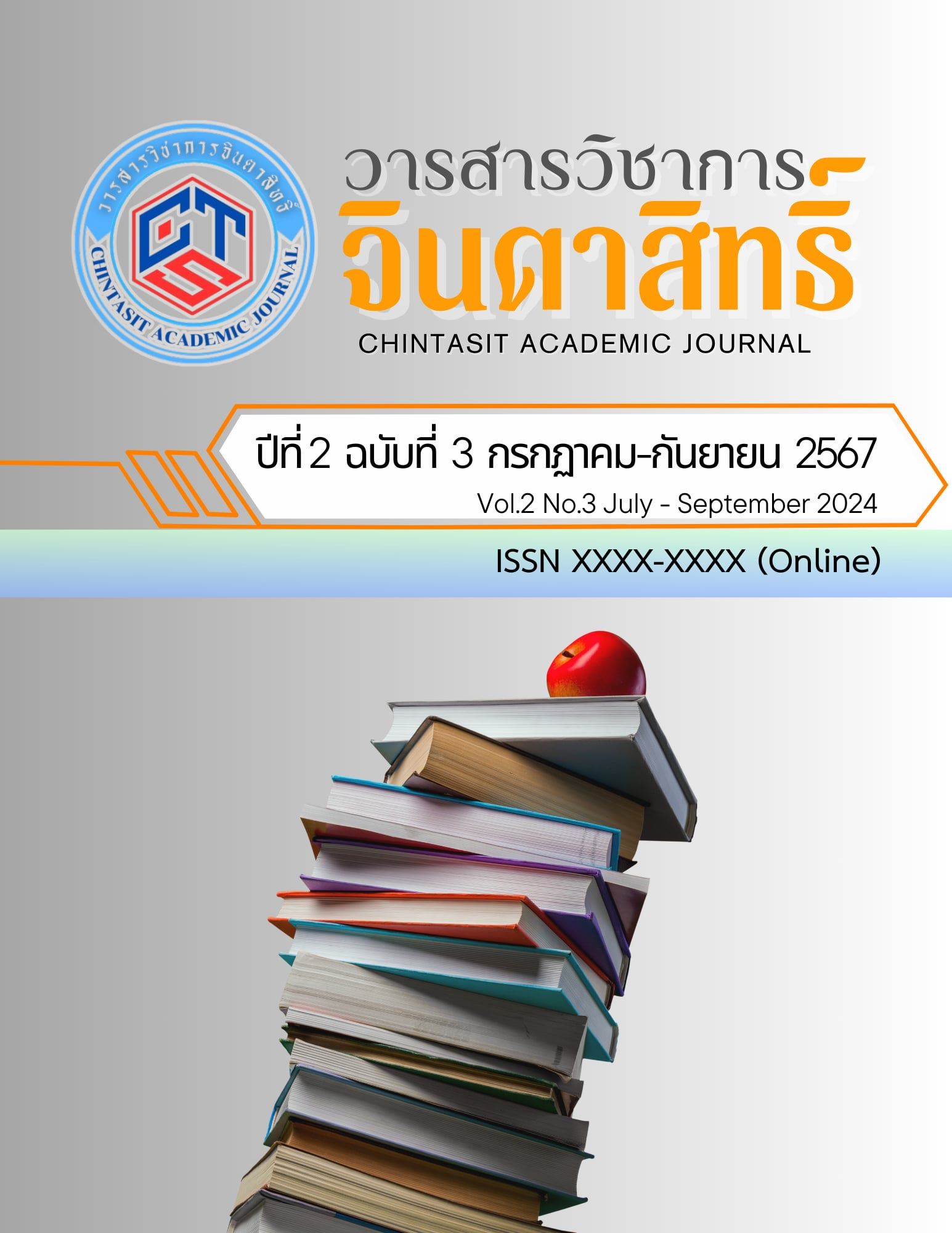The Use of AI Technology in Adaptive Learning
Main Article Content
Abstract
This article presents the application of Artificial Intelligence (AI) technology in adaptive learning, an educational innovation that is gaining significant attention. The study analyzes the working principles, benefits, and challenges of using AI in adaptive learning, as well as presenting case studies and future trends. The findings indicate that AI can significantly enhance the efficiency of adaptive learning by assisting in learner data analysis, content and teaching method adjustment, and providing personalized feedback. Furthermore, the article discusses challenges related to privacy, ethics, and the integration of technology into educational systems, along with proposed solutions to these issues. The paper also presents case studies from both Thailand and abroad to demonstrate the application of AI in adaptive learning across various contexts. Finally, the article addresses future trends in the use of AI in education, including the development of social and emotional skills, integration with virtual and augmented reality technologies, and the development of explainable AI.
Article Details

This work is licensed under a Creative Commons Attribution-NonCommercial-NoDerivatives 4.0 International License.
Chintasit Academic Journal is licensed under a Creative Commons Attribution-NonCommercial-NoDerivatives 4.0 International (CC BY-NC-ND 4.0) licence, unless otherwise stated. Please read our Policies page for more information on Open Access copyright and permissions.
References
ศรีศักดิ์ จามรมาน. (2565). แนวทางการรักษาความปลอดภัยของข้อมูลผู้เรียนในระบบ AI ทางการศึกษา. วารสารวิชาการเทคโนโลยีสารสนเทศและการสื่อสาร, 5(2), 45-58.
นวลจันทร์ จุฑาภักดีกุล. (2566). การพัฒนาระบบ AI เพื่อประเมินและพัฒนาทักษะทางอารมณ์และสังคมของเด็กปฐมวัย. วารสารจิตวิทยาการศึกษา, 15(1), 12-28.
นภาพร ชุมวงศ์. (2565). การพัฒนาระบบ AI สำหรับการให้คำแนะนำและแนวทางการพัฒนาทักษะเฉพาะด้านแก่ผู้เรียน. วารสารเทคโนโลยีและสื่อสารการศึกษา, 12(3), 78-95.
ใจทิพย์ ณ สงขลา. (2564). แนวทางการบูรณาการ AI เข้ากับระบบการศึกษาไทย. วารสารครุศาสตร์, 49(3), 234-251.
สุชาติ ธาดาธำรงเวช. (2564). ผลของการใช้ AI ในการปรับเหมาะการเรียนการสอนต่อผลสัมฤทธิ์ทางการเรียน. วารสารศึกษาศาสตร์, 32(2), 67-82.
ธนารักษ์ ธีระมั่นคง. (2562). การใช้เทคนิค Deep Learning ในการสร้างโมเดลผู้เรียนสำหรับการเรียนรู้แบบปรับเหมาะ. วารสารปัญญาประดิษฐ์และการประยุกต์ใช้, 6(1), 15-30.
ธนารักษ์ ธีระมั่นคง. (2565). การพัฒนาเทคนิค Explainable AI สำหรับระบบการเรียนรู้แบบปรับเหมาะ. วารสารวิทยาการคอมพิวเตอร์และเทคโนโลยีสารสนเทศ, 18(2), 45-60.
ปรัชญนันท์ นิลสุข. (2563). การพัฒนาระบบ AI สำหรับการวิเคราะห์ผลการเรียนและออกแบบแผนการสอน. วารสารเทคโนโลยีการศึกษา, 17(1), 89-104.
มหาวิทยาลัยเชียงใหม่. (2565). รายงานผลการดำเนินโครงการ AI Tutor สำหรับการสอนวิชาฟิสิกส์ระดับมหาวิทยาลัย. คณะวิทยาศาสตร์ มหาวิทยาลัยเชียงใหม่.
กมล รอดคล้าย. (2563). การใช้เทคโนโลยี AI ในการพัฒนาการศึกษาไทย. วารสารนโยบายการศึกษา, 7(2), 5-18.
กนกวรรณ วิลาวัลย์. (2563). มาตรการลดความเหลื่อมล้ำในการเข้าถึงเทคโนโลยี AI ทางการศึกษา. วารสารนโยบายและแผนการศึกษา, 11(4), 56-71.
ชัยวุฒิ เซี่ยงหลิว. (2564). การพัฒนาระบบวิเคราะห์ข้อมูลการเรียนรู้สำหรับการเรียนการสอนแบบปรับเหมาะ. วารสารวิทยาการข้อมูล, 9(2), 123-140.
Bailenson, J. N. (2022). VR for education: Promises and challenges. Educational Psychologist, 57(3), 198-212. https://doi.org/10.1080/00461520.2021.1987798
Baker, R. S. (2019). Challenges for the future of educational data mining: The Baker learning analytics prizes. Journal of Educational Data Mining, 11(1), 1-17.
Baker, R. S. (2020). Stupid tutoring systems, intelligent humans. International Journal of Artificial Intelligence in Education, 30(2), 113-129. https://doi.org/10.1007/s40593-020-00207-1
Conati, C., Porayska-Pomsta, K., & Mavrikis, M. (2018). AI in Education needs interpretable machine learning: Lessons from open learner modelling. arXiv. https://doi.org/10.48550/arXiv.1807.00154
Drachsler, H., & Greller, W. (2016). Privacy and analytics: It's a DELICATE issue a checklist for trusted learning analytics. In Proceedings of the sixth international conference on learning analytics & knowledge (pp. 89-98). ACM. https://doi.org/10.1145/2883851.2883893
Escueta, M., Quan, V., Nickow, A. J., & Oreopoulos, P. (2017). Education technology: An evidence-based review (NBER Working Paper No. 23744). National Bureau of Economic Research. https://www.nber.org/papers/w23744
Holmes, W., Bialik, M., & Fadel, C. (2019). Artificial intelligence in education: Promises and implications for teaching and learning. Center for Curriculum Redesign.
Holstein, K., McLaren, B. M., & Aleven, V. (2018). Student learning benefits of a mixed-reality teacher awareness tool in AI-enhanced classrooms. In C. Penstein Rosé et al. (Eds.), Artificial Intelligence in Education (pp. 154-168). Springer. https://doi.org/10.1007/978-3-319-93843-1_12
Holstein, K., McLaren, B. M., & Aleven, V. (2019). Co-designing a real-time classroom orchestration tool to support teacher–AI complementarity. Journal of Learning Analytics, 6(2), 27-52. https://doi.org/10.18608/jla.2019.62.3
Jivet, I., Scheffel, M., Schmitz, M., Robbers, S., Specht, M., & Drachsler, H. (2021). From students with love: An empirical study on learner goals, self-regulated learning and sense-making of learning analytics in higher education. The Internet and Higher Education, 50, 100804. https://doi.org/10.1016/j.iheduc.2021.100804
Koller, D. (2019). AI and the future of education. In Proceedings of the AAAI Conference on Artificial Intelligence (Vol. 33, No. 01, pp. 9795-9799). https://doi.org/10.1609/aaai.v33i01.33019795
Kulik, J. A., & Fletcher, J. D. (2016). Effectiveness of intelligent tutoring systems: A meta-analytic review. Review of Educational Research, 86(1), 42-78. https://doi.org/10.3102/0034654315581420
Luckin, R. (2018). Machine learning and human intelligence: The future of education for the 21st century. UCL Institute of Education Press.
Luckin, R., Holmes, W., Griffiths, M., & Forcier, L. B. (2016). Intelligence unleashed: An argument for AI in education. Pearson.
Natriello, G. (2017). The adaptive learning landscape. Teachers College Record, 119(3), 1-22.
NECTEC. (2022). AI for Education Project Report. National Electronics and Computer Technology Center.
Pane, J. F., Steiner, E. D., Baird, M. D., & Hamilton, L. S. (2015). Continued progress: Promising evidence on personalized learning. RAND Corporation. https://www.rand.org/pubs/research_reports/RR1365.html
Pane, J. F., Griffin, B. A., McCaffrey, D. F., & Karam, R. (2014). Effectiveness of cognitive tutor algebra I at scale. Educational Evaluation and Policy Analysis, 36(2), 127-144. https://doi.org/10.3102/0162373713507480
Papamitsiou, Z., & Economides, A. A. (2014). Learning analytics and educational data mining in practice: A systematic literature review of empirical evidence. Educational Technology & Society, 17(4), 49-64.
Reich, J., & Ito, M. (2017). From good intentions to real outcomes: Equity by design in learning technologies. Digital Media and Learning Research Hub.
Settles, B., Brust, C., Gustafson, E., Hagiwara, M., & Madnani, N. (2018). Second language acquisition modeling. In Proceedings of the thirteenth workshop on innovative use of NLP for building educational applications (pp. 56-65). Association for Computational Linguistics. https://doi.org/10.18653/v1/W18-0506
VanLehn, K. (2011). The relative effectiveness of human tutoring, intelligent tutoring systems, and other tutoring systems. Educational Psychologist, 46(4), 197-221. https://doi.org/10.1080/00461520.2011.611369
Woolf, B. P., Lane, H. C., Chaudhri, V. K., & Kolodner, J. L. (2013). AI grand challenges for education. AI Magazine, 34(4), 66-84. https://doi.org/10.1609/aimag.v34i4.2490


